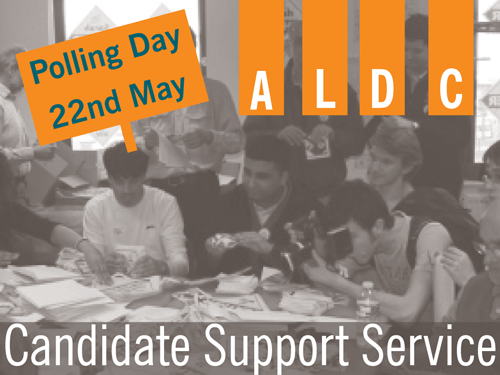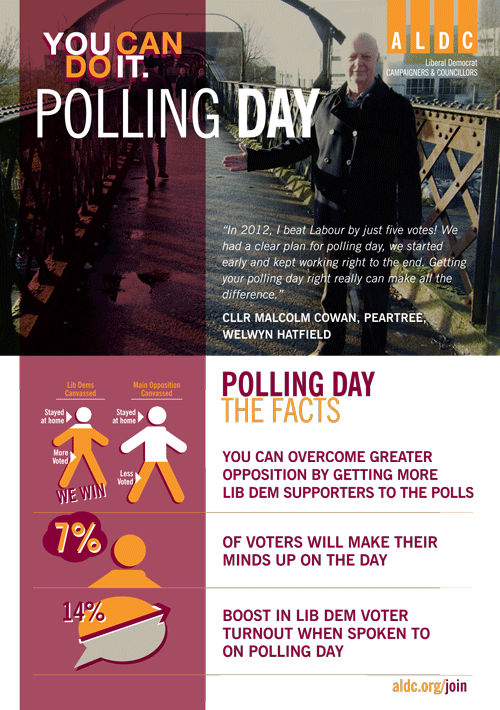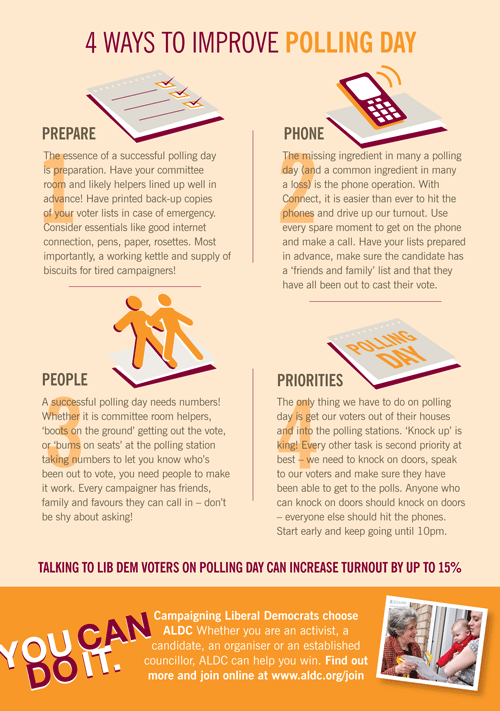
With 1 week to go
It ‘s the final literature push and peak. Start on pre-knocking. Focus on key groups eg Squeeze or switch
THINGS TO DO THIS WEEK
- Pre- Knock your shuttleworth
- Deliver Final Weekend Leaflet
- Deliver Blue letters if not already done.
- Deliver 4S target mailings
- Deliver good mornings/good evenings
- Get you posters and stakeboards out and up. Call on those with posters to ask them t0 up-grade!
THINGS TO PREPARE FOR
- Get trained for polling day -Two weeks ago we talked about planning your “Get out the Vote” GOTV campaign, LDHQ are running OSKAR online Webinar training sessions on GOTV . Sign up here . Quick sheet instruction for polling day in Connect are here.
- Check and build your telling rota
- Ask for polling day help, ask friends, workmates, family as well as all you helpers and deliverers.
- Confirm your committee rooms
- Train your volunteers for Knocking Up, Telling and the count.
- Build your shutttleworth
DATES FOR YOUR DIARY
- Thursday 15th May – Deadline for the appointment of polling and counting agents.
ELECTION LAW ROUND UP- Postal Vote Opening
The opening process
The detailed process of the postal vote opening will vary from council to council but should follow this broad model.
1. Outer envelope of returned postal votes opened – the ballot paper should be in a second envelope sealed inside this and shouldn’t be opened until later in the process
2. The declaration is checked:
- If there is no declaration then paper provisionally rejected
- The declaration is checked that it relates to the ballot paper returned – if it doesn’t then again the ballot will be declared provisionally rejected
- The details on the declaration will be checked. If it is unsigned or no birth date is included it will be rejected.
Where ballots are provisionally rejected it is possible that the declaration will come to light later in the process. It is common for the declaration to be included sealed in with the ballot paper for example.
3. The “valid” Ballot envelopes placed in ballot box.
The signature and date of birth must be checked for a minimum sample of 20% of the ballot papers, though many councils appear to be checking 100%. In the case of disputed samples the Returning Officer has access to expert advice on handwriting comparison.
- If ballot papers are to be rejected at this stage, agents can object to exclusion of papers. There is of course a problem in that you don’t know who they have voted for! Where there is an objection the papers will be marked as such and this can be used in the event of a legal challenge
- If a paper is so rejected it will be removed from the ballot box
4. The box containing the valid ballot envelopes will be emptied, the envelopes opened and sorted into piles. It will be common to find some missing declarations at this stage.
During this stage the ballot papers should be kept face down (Representation of the People Regulations 2001 rule 84(6)).
The ballot papers will then be kept securely ready for the count proper after 10pm on polling day.
What you can get from the postal vote count
- Information about the progress of postal voting – eg if return rates are quite slow extra publicity about returning them by a particular date or specific campaigns in wards if returns are below average
- Information about voting performance is, however, harder to pick up as ballot papers are counted face down. There is a requirement on the Returning Officer to preserve the secrecy of the ballot and some councils ensure that counting agents are kept some distance from the tables to help in this.
There are also provisions which preventing the publication of information obtained from postal vote openings. The combination of these two factors mean it is important to consider whether you will get any useful information you will get from attending the postal vote count..
Furthermore, many councils have postal vote openings every day and they would often take the full day. It is not going to be a good used of activists time during the last 10 days of the campaign to be watching envelopes being opened!
It may be useful to attend the first opening to check that the correct procedures are being followed and to get a feel for how things are going with returns. Helpful returning officers may if asked provide information as to the number of returned postal votes to date which will be useful. Really helpful ones may even give you a breakdown by ward, there is though no requirement for them to do this.

